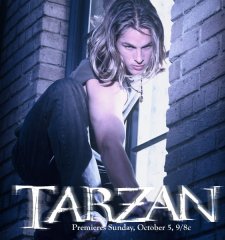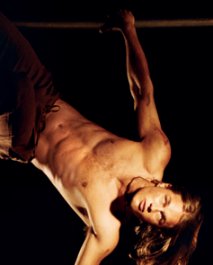
On some primal level, even the WB knows that its Tarzan just doesn't quite click. While not coming out and directly saying so, you can read between the lines when the "coming attractions" at the end exhorts you to watch "…in a couple of weeks."
Why not next week? There's an episode being shown. But it doesn't have the network's desperate ace-in-the-hole…the erstwhile warrior princess Lucy Lawless coming onboard as a series regular to help draw our attention from the pretty vacuum that is Travis Fimmel.
It's not that The WB's Tarzan sucks. Actually, though I wanted to hate it, there are parts that work. Clearly, though, the WB had to add in that possessive in the title so as not to be confused with Walt Disney's Tarzan or, heaven forbid, Edgar Rice Burroughs' Tarzan.
What the network has done that those other two have not was actually update the story, brutally ripping it from its quaint colonial origins as a tale set in deepest, darkest Africa (when you could get away with saying such a thing about Africa). Though we get a glimpse of Tarzan in his natural habitat in flashback, the only jungle the WB cares about is one of concrete and steel.
The opening establishes Tarzan as a sometime escapee from the Greystoke Corporation. As the episode unfolds we understand him to be heir to the multinational conglomerate, far more sensible to modern audiences than the landed title of Burroughs' original. While the young John Clayton (hey, they kept his real name!) had been thought lost and/or dead, his uncle Richard (Mitch Pileggi) has run the company. For years, though, Richard sought for proof of the final fate of his brother's family.
And though we know that Richard must have nefarious intentions, the script by Eric Kripke doesn't overplay it. Combined with Pileggi's experience as a man that keeps secrets well, this first episode even lets Richard seem somewhat well-meaning - except for the isolating John and trying to conduct medical experiments on him part. Though Tarzan argues that Richard didn't save him from the jungle - Richard, in fact, shot him not knowing what he was - the uncle's sins seem to be more based in a wealthy man's unconscious arrogance than outright evil.
 In
a lot of places, in fact, Kripke leaves things subtle, though
he also has his fair share of lapses in logic. One unexpected
escape from Greystoke by the lord of the jungle is somewhat
understandable; that the script includes a second (and can't
be bothered to show it), then even includes a similar escape
from the NYPD, does not bode well for the formula of this
series.
In
a lot of places, in fact, Kripke leaves things subtle, though
he also has his fair share of lapses in logic. One unexpected
escape from Greystoke by the lord of the jungle is somewhat
understandable; that the script includes a second (and can't
be bothered to show it), then even includes a similar escape
from the NYPD, does not bode well for the formula of this
series.
Along those formula lines is also the changing of Jane Porter's
(Sarah Wayne Callies) line of work to being a cop. That part
sits fairly easily, giving us a shorthand for her personality
and why Tarzan would be attracted to it. But it also means
that the series could easily devolve into "Jane gets in too
deep and Tarzan comes and rescues her."
At least Callies comes off as strong without being annoyingly
perky, and if she's not the most believable young female police
detective in television history, she's certainly a step forward
for a network that panders to the Sweet Valley High
set. (Of course, we've got Jane's sister for that...)
And then there are those awful, obligatory WB slow pans around the lovers set to a pop song. A pop song the title of which I do not know, but do know that both Smallville and Birds of Prey used for the exact same effect. In other words, to bore comic book junkies and actual fans of the characters but entice the young girls who don't care that Fimmel has less emotional range than Derek Zoolander. They just want to see him sniff Jane's neck.
Therein lies the tragedy of this show. Fimmel may look the part (and I'll even argue that - not even Ron Ely was this Aryan in the role), but all he can do is look pretty. Most attempts at the Tarzan mythos have not required the most adept of actors, but after Christopher Lambert's turn in Greystoke and the soulfulness of Tony Goldwyn in the Disney version, we need a little more.
 Instead,
we get a Tarzan along the lines of Casper Von Dien's turn
in the abominable Tarzan and the Lost City (hmmm…also
a Warner product). The two do share in common a trait of wearing
pants rather than loincloths. For gosh sakes, Fimmel was an
underwear model - of all people, he should be used to traipsing
around the city nearly naked.
Instead,
we get a Tarzan along the lines of Casper Von Dien's turn
in the abominable Tarzan and the Lost City (hmmm…also
a Warner product). The two do share in common a trait of wearing
pants rather than loincloths. For gosh sakes, Fimmel was an
underwear model - of all people, he should be used to traipsing
around the city nearly naked.
What should be a key moment finds Tarzan wandering Times
Square - lost, confused, and in wondering awe. On paper, it
was probably a really good scene. He hears drumming, and finds
an African-American percussion group performing. Crouching
down, he becomes lost in the rhythm of his unseen memories
(the only other hint as to what happened to him in the jungle).
Fimmel can't carry off the scene; luckily, Callies shows that
Jane understands the emotional significance of the
moment.
Between Callies and Pileggi, this show could develop into something interesting. Jane knows Richard Clayton is hiding something, and can't seem to prove anything due to his being a leading figure in the city, a conflict so far more compelling to her than how John Clayton really became Tarzan. Perhaps everybody involved assumes we know that part of the story, so why bother with it?
"In a couple of weeks" (I don't know why the announcer saying that cracked me up, but it did) we'll get Lawless into the show, and seeing those three mix it up could prove worth following. But shouldn't we actually want to watch the title character?
Not so far.

 In
a lot of places, in fact, Kripke leaves things subtle, though
he also has his fair share of lapses in logic. One unexpected
escape from Greystoke by the lord of the jungle is somewhat
understandable; that the script includes a second (and can't
be bothered to show it), then even includes a similar escape
from the NYPD, does not bode well for the formula of this
series.
In
a lot of places, in fact, Kripke leaves things subtle, though
he also has his fair share of lapses in logic. One unexpected
escape from Greystoke by the lord of the jungle is somewhat
understandable; that the script includes a second (and can't
be bothered to show it), then even includes a similar escape
from the NYPD, does not bode well for the formula of this
series.
 Instead,
we get a Tarzan along the lines of Casper Von Dien's turn
in the abominable Tarzan and the Lost City (hmmm…also
a Warner product). The two do share in common a trait of wearing
pants rather than loincloths. For gosh sakes, Fimmel was an
underwear model - of all people, he should be used to traipsing
around the city nearly naked.
Instead,
we get a Tarzan along the lines of Casper Von Dien's turn
in the abominable Tarzan and the Lost City (hmmm…also
a Warner product). The two do share in common a trait of wearing
pants rather than loincloths. For gosh sakes, Fimmel was an
underwear model - of all people, he should be used to traipsing
around the city nearly naked.





